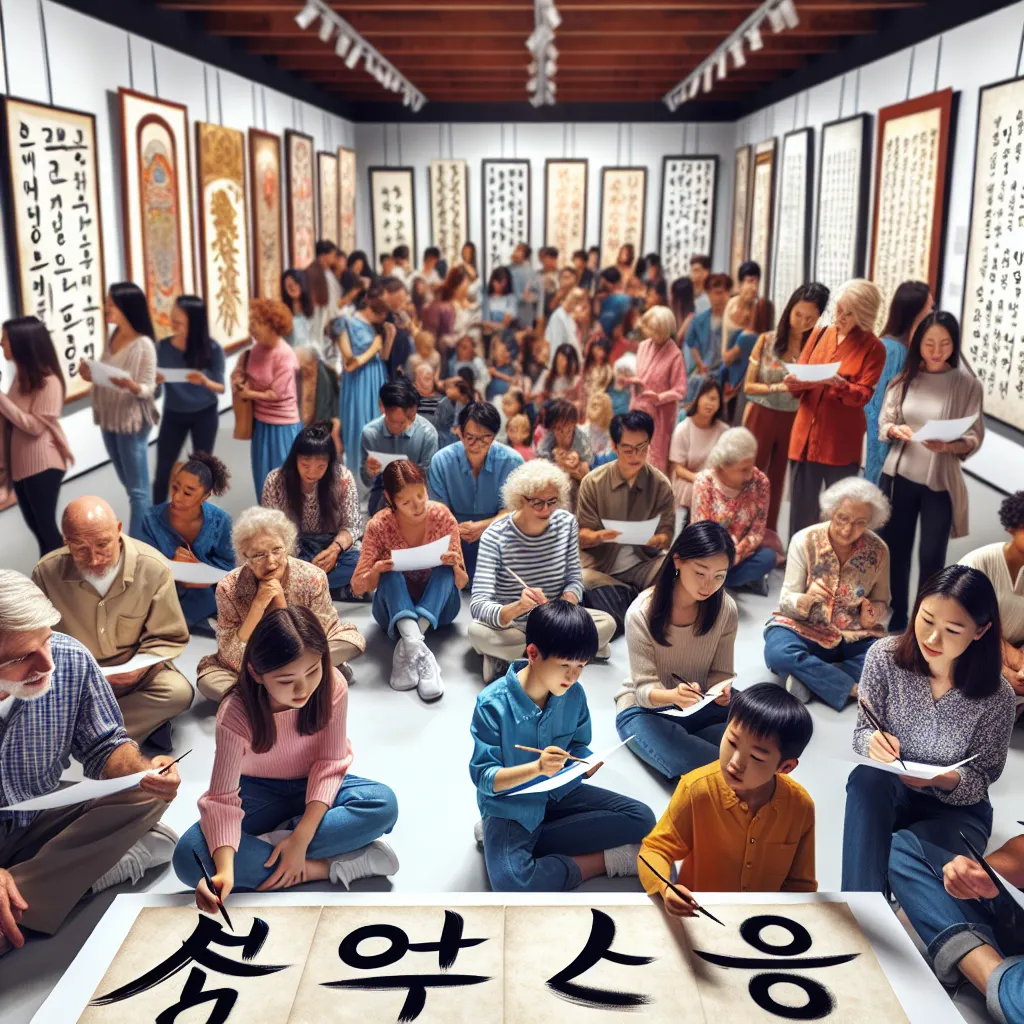On Hangeul Day, we celebrate more than just an alphabet – we honor a symbol of Korean cultural identity and linguistic pride. The creation of Hangeul marked a significant turning point in Korean history, emphasizing the importance of language in shaping a nation’s identity. Today, as we commemorate Hangeul Day, we reflect on the enduring significance of this unique writing system and its role in preserving our heritage. By recognizing the beauty and efficiency of Hangeul, we pay tribute to the ingenuity of its creators and the resilience of Korean culture. As we delve into the history and cultural impact of Hangeul, we gain a deeper appreciation for the rich tapestry of traditions that make up Korean identity. Let us celebrate Hangeul Day with a sense of reverence for our past and a commitment to preserving our linguistic heritage for future generations.

The Origin of Hangeul
In the rich tapestry of Korean history, the creation of Hangeul stands as a testament to the ingenuity and foresight of King Sejong the Great. In the 15th century, amidst a society where only the privileged few could read and write using Chinese characters, King Sejong recognized the need for a writing system that could be easily learned and accessible to all. Thus, the idea of Hangeul was born, a phonetic alphabet designed to represent the sounds of spoken Korean.
The Creation of Hangeul
Hangeul, composed of 14 consonants and 10 vowels, was meticulously crafted to reflect the shape of the speech organs when producing each sound. This scientific approach to linguistics was revolutionary for its time, setting Hangeul apart from other writing systems. The alphabet’s simplicity and logical structure made it a powerful tool for literacy and communication, empowering the Korean people to express themselves more freely.
The Impact of Hangeul
Unlike Chinese characters, which required years of study to master, Hangeul could be learned in a matter of days. This accessibility democratized education and knowledge, leading to a significant increase in literacy rates across the Korean peninsula. The impact of Hangeul on Korean society cannot be overstated, as it became a unifying force that strengthened cultural identity and national pride.
Celebrating Hangeul Day
Today, on Hangeul Day, we celebrate not just the alphabet itself, but the spirit of innovation and inclusivity that it represents. Hangeul is more than just a writing system; it is a symbol of resilience and creativity, a reminder of the power of language to shape our world. Let us honor the legacy of King Sejong and the scholars who brought Hangeul to life, embracing our cultural heritage with pride and gratitude.
As we reflect on the origin of Hangeul, let us remember the words of King Sejong himself: “A wise man can acquaint himself with them before the morning is over; a stupid man can learn them in the space of ten days.” These words capture the essence of Hangeul – a gift to the Korean people, a treasure to be cherished for generations to come.
Celebrating Hangeul Day
Hangeul Day is not just a celebration of an alphabet; it is a celebration of Korean cultural identity, resilience, and progress. Let us continue to honor and preserve the legacy of Hangeul, ensuring that future generations appreciate the significance of this remarkable writing system. Happy Hangeul Day to all!
Remember, Hangeul is not just letters on a page; it is the heartbeat of a nation, the voice of a people. Let us continue to embrace and celebrate the beauty and power of Hangeul in all its glory! 🇰🇷✨
Significance of Hangeul Day
Hangeul Day, celebrated on October 9th each year, holds great significance in South Korea and among Korean communities worldwide. This day commemorates the creation of the Korean alphabet, Hangeul, by King Sejong the Great in the 15th century. Hangeul is renowned for its scientific design and ease of learning, making it a unique and valuable cultural asset.
The Importance of Hangeul Day
Hangeul Day is a time to honor the linguistic heritage of Korea and recognize the importance of language in shaping cultural identity. The creation of Hangeul was a revolutionary step towards literacy and communication for all social classes, as it replaced the complex Chinese characters previously used in Korea.
King Sejong’s Vision for Hangeul
King Sejong’s vision for Hangeul was to ensure that all people, regardless of their social status or education level, could easily learn to read and write. This commitment to accessibility and inclusivity is reflected in the alphabet’s simple and logical structure, with 14 consonants and 10 vowels that combine to form syllables.
Legacy of Hangeul
Today, Hangeul remains a source of pride for Koreans worldwide, symbolizing their rich cultural heritage and linguistic distinctiveness. It is not just a writing system but a reflection of Korean identity, history, and creativity. The Korean language, written in Hangeul, has played a crucial role in preserving and transmitting Korean traditions and values across generations.
Practical Benefits of Hangeul
Beyond its cultural significance, Hangeul has practical benefits as well. Studies have shown that learning to read and write in Hangeul can enhance cognitive abilities and linguistic skills. The scientific design of the alphabet, based on phonetic principles, facilitates efficient language learning and communication.
Celebrating Hangeul Day
Hangeul Day celebrations often include various cultural events, exhibitions, and contests that showcase the beauty and versatility of the Korean alphabet. It is a time for people to come together and appreciate the beauty of Hangeul, reinforcing its importance in Korean society.
In Conclusion
In conclusion, Hangeul Day is not just a commemoration of a writing system; it is a celebration of Korean cultural identity, language, and heritage. The significance of Hangeul extends far beyond its linguistic function, embodying the spirit of innovation, inclusivity, and national pride. As we mark Hangeul Day each year, we reaffirm our commitment to preserving and promoting this invaluable aspect of Korean culture.
Celebrating Cultural Identity through Hangeul
The Korean alphabet, known as Hangeul, stands as a testament to the rich cultural heritage and identity of Korea. Created in the 15th century by King Sejong the Great, Hangeul was designed to be easy to learn and accessible to all, regardless of social status or education. This innovative script consists of 24 letters, each representing a unique sound, making it one of the most scientific writing systems in the world.
Hangeul Day
Hangeul Day, celebrated on October 9th in South Korea, honors the creation and significance of this iconic alphabet. It serves as a reminder of the importance of language in shaping cultural identity and preserving traditions. Through Hangeul, Koreans can express their thoughts, emotions, and stories in a way that is deeply rooted in their history and values.
The impact of Hangeul goes beyond just a writing system; it is a symbol of national pride and unity. By promoting the use of Hangeul in various aspects of society, from literature and education to technology and pop culture, Koreans reinforce their cultural identity and strengthen their sense of belonging. This linguistic heritage is a source of inspiration and creativity, evident in the vibrant Korean entertainment industry and the global popularity of K-pop and K-dramas.
Preserving Cultural Identity
Hangeul has played a crucial role in preserving Korea’s cultural identity in the face of external influences. As the world becomes more interconnected, language serves as a powerful tool for asserting one’s unique heritage and values. Through Hangeul, Koreans can assert their distinctiveness and share their stories with the world, fostering cross-cultural understanding and appreciation.
In conclusion, Hangeul is not just an alphabet; it is a reflection of the Korean spirit and a celebration of cultural diversity. By embracing and promoting Hangeul, Koreans continue to uphold their traditions and pass down their heritage to future generations. Let us join in celebrating Hangeul Day and recognizing the profound impact of this remarkable writing system on Korean culture and identity. 🎉🇰🇷
Preserving and Promoting Hangeul Today
In the realm of linguistics and cultural heritage, the Korean alphabet, known as Hangeul, stands as a symbol of innovation and national pride. Created in the 15th century under the reign of King Sejong the Great, Hangeul was designed to be accessible to all, regardless of social status or education level. Its scientific and systematic structure has been praised by linguists worldwide, with UNESCO even designating Hangeul as a Masterpiece of the Oral and Intangible Heritage of Humanity.
The Importance of Hangeul Preservation
Today, the importance of preserving and promoting Hangeul goes beyond just linguistic significance. It is a key element in maintaining Korea’s cultural identity and heritage. With the rise of globalization and the dominance of English as a global language, there is a growing need to protect and elevate indigenous languages like Hangeul.
Efforts to Promote Hangeul
In South Korea, efforts to promote Hangeul are evident in various aspects of society. The government has implemented policies to ensure the use of Hangeul in official documents, public signage, and education. The Korean language is also actively promoted through cultural events, such as Hangeul Day on October 9th, celebrating the creation and significance of the alphabet.
Challenges and Opportunities in the Digital Age
The digital age has brought both challenges and opportunities for Hangeul. While the internet and social media have provided platforms for the widespread use of the Korean language, there is also a concern about the impact of digital communication on traditional writing systems. Emoticons, abbreviations, and English loanwords have become prevalent in online communication, raising questions about the future of Hangeul in the digital landscape.
Innovative Approaches to Promote Hangeul
To address these challenges, educators, linguists, and cultural institutions are working together to develop innovative ways to promote Hangeul in the modern world. Online platforms and mobile applications are being utilized to make learning the Korean language more accessible and engaging for a global audience. The popularity of K-pop and Korean dramas has also contributed to the increased interest in learning Hangeul and understanding Korean culture.
Looking to the Future
As we look to the future, it is crucial to continue the efforts in preserving and promoting Hangeul as a vital part of Korea’s cultural heritage. By embracing the past while adapting to the demands of the present, Hangeul can continue to thrive as a symbol of national identity and linguistic excellence. Let us celebrate Hangeul not just on Hangeul Day, but every day, as we recognize its enduring legacy and significance in the modern world. 🇰🇷📚✨
As we celebrate Hangeul Day, we honor not just the Korean alphabet, but also the rich cultural identity it represents. The creation of Hangeul by King Sejong the Great reflects a deep commitment to literacy and communication. Today, Hangeul Day serves as a reminder of the significance of this writing system in preserving Korean heritage. Through various events and activities, Koreans come together to celebrate their language and culture, fostering a sense of unity and pride. Furthermore, the efforts to promote and preserve Hangeul in modern times ensure that future generations will continue to appreciate its beauty and importance. Hangeul Day is not just a commemoration; it is a reaffirmation of the enduring legacy of the Korean alphabet and its role in shaping Korean identity.
